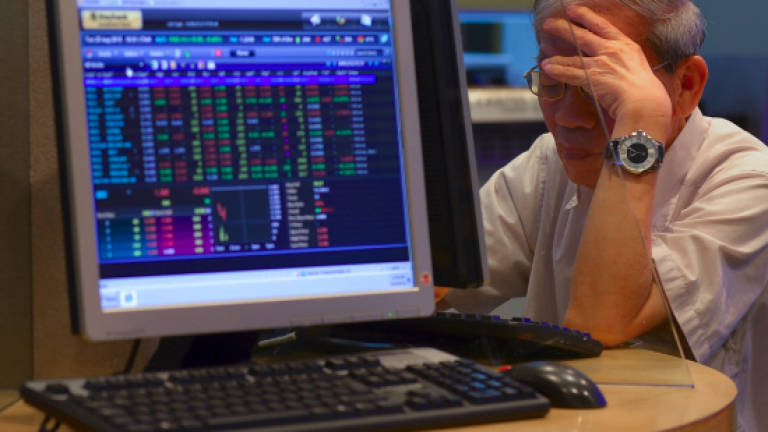Will local stocks rally in run-up to GE14?

PETALING JAYA: Will the local stock market see another round of rally as the August 2018 deadline for the 14th General Election (GE14) nears?
The answer looks more likely to be a “nay”, rather than an “aye”.
Hong Leong Investment Bank Research head Sia Ket Ee said both external headwinds and lacklustre corporate earnings are seen as the stumbling blocks for the stock market to move up further.
At last Friday’s close of 1,786.33, the FBM KLCI is now about 107 points or 5.6% away from its all-time high of 1,893 points posted in July 2014. Year to date, the key index has risen 8.8%.
However, Areca Capital Sdn Bhd CEO Danny Wong said the bullishness of the equity market should not be benchmarked against the FBM KLCI, which tracks the movements of only the 30 largest stocks on the local bourse.
“Actually the rally already started this year, but I think the momentum will continue. More than two-thirds of the stocks under my coverage are in line with or above expectations. So I don’t think corporate earnings are bad.”
Nonetheless, Sia is of the view that the market still lacks strong catalysts on the back of weak corporate earnings.
“Earnings fundamentals have been quite lacklustre. That’s why I think the market will end up with this sideways momentum for the coming weeks.”
Externally, he said, there are more uncertainties around, particularly coming from the geopolitical tensions in the Korean Peninsula.
Sia said the market is aware of GE14 looming but, due to the absence of strong fundamentals, the market rally may not happen.
“Project awards are already made known to the market and the market is fully aware of what’s coming, like LRT 3 and MRT 2. Going into next year, there will be the East Coast Rail Link.
“I don’t think the market wants to trade at a premium now. It will be hovering around the 1,760-point level, which is also our year-end target.”
Sia said the rally had actually happened in the first half of the year, in line with the improved macroeconomic data. “So right now, we’re just coming back to fundamentals and everyone is waiting for the election to happen.”
While the export segment has been doing well, primarily due to higher external demand for the electrical and electronics products, Sia pointed out that there are more volatilities in the technology space now, judging from Nasdaq’s performance.
For domestic-oriented sectors like the cyclical banking industry, he said there has been a recovery from the low base last year, evidenced by the recovery in gross domestic product (GDP) and private consumption.
“But the key question is still the financial performance. So far, we’ve seen a lot of margin compression still happening, meaning there is still an expansion in top line in tandem with the domestic recovery, but yet it fails to translate into stronger earnings.”
Again, he said the investors are still very cautious as GDP growth could have peaked in Q2, resulting in the challenge of translating revenue into earnings.
“So that is also putting dampener on sentiment. While revenues have been growing, it may not necessarily translate into stronger earnings because of the cost-push factors.”
For the construction sector, Sia noted that the market is still waiting for the rollout of more contracts, particularly for rail-related projects.
Areca Capital’s Wong expects contract flows to be better in the second half compared with the first half of the year ahead of Budget 2018.
Meanwhile, Sia said the consumer sector may eventually see a further improvement as private consumption has shown recovery.
JPMorgan’s Asia Pacific Equity Research also opined that the upcoming polls may have a less risk averse effect on the market, which appears to be less volatile compared with past polls.
“Given significantly reduced market volatility we assume the consensus positioning is one that favours the status quo. The market is less risk-averse this time compared with the 13th General Election, presumably on lack of opposition alliance coherence and street demonstrations,” the research house said in its report, “Malaysia Strategy: Key Trades Ahead of the 14th GE”.
“Our recommended investment strategy is to focus on thematics and key trades on stock specifics,” it added.
The research house favours Tenaga Nasional, IJM Corp, Gamuda, Malayan Banking, Sime Darby and SP Setia.
Property developers, construction and healthcare stocks gained the most before and after GE13.
Construction players are set to gain should the current government retain its mandate, as more project awards are expected.
JPMorgan views the year-to-date gain in the FBM KLCI, a stable and higher ringgit, above expectation GDP growth, restructuring in Permodalan Nasional Bhd companies, flow of construction projects with LRT 3 and other rail-related infrastructure, and completion of BR1M handouts as tell-tale signs that Malaysia is en route to the ballot box.
However based on trends from past elections, there appears to be no clear-cut indicator on the ringgit’s standing going forward.